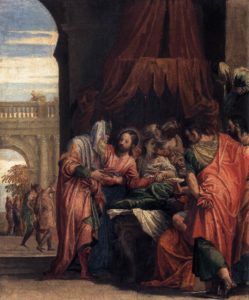Thoughts on Sunday’s Lessons for July 1, 2018
First Reading (Track One): 2 Samuel 1:1, 17-27

The Raising of Jairus’ daughter (c.1546), oil painting by Paolo Veronese (1528-1588). The Louvre, Paris. (Click image to enlarge.)
Our journey through the story of Israel’s kings moves into the second book of Samuel. After a series of conflicts between Saul and David, King Saul has died, the battle against the Amalekites has been won, and David is king in his own right. Despite his troubled relationship with Saul, in today’s reading we hear David mourning the death of Saul. But that grief is eclipsed by David’s deep grief over the loss of Jonathan, Saul’s oldest son and David’s beloved friend, as the reading concludes with a long, loving ballad that David calls the Song of the Bow, in which he declares Jonathan’s love for him “wonderful, passing the love of women.”
First Reading (Track Two): Wisdom of Solomon 1:13-15; 2:23-24
Love is so strong that it has power even over death. God desires neither death nor destruction for us. We hear these hopeful ideas in today’s first reading, and they recur through the day’s readings. First we read the Wisdom of Solomon (often simply called “Wisdom”) from the apocrypha, the 15 “extra” books included at the end of the Hebrew Bible. These verses, following just after a warning to an earthly ruler not to invite his own death or destruction by behaving badly, remind us that God’s creation celebrates our life, not our death. God’s creation is a thing of beauty, and righteousness lives forever.
Psalm (Track One): Psalm 130
When we sing this psalm of faithful hope in God, we express our confidence that God’s love and grace wait for us even when we are deep in grief, as David grieved upon the death of Jonathan. Out of the depths we call out to God, knowing that we will be heard, for there is always forgiveness in God. We wait for God, as even in night’s darkest hours we wait for morning light.
Psalm (Track Two): Lamentations 3:21-33
This short, song-like passage from Lamentations, a short book traditionally attributed to Jeremiah, may be used in place of today’s Psalm. In these verses, echoing the hope and trust in God’s love that we hear the first reading, we sing of our hope in God’s steadfast love that never ends, love that is renewed every morning. In words reminiscent of the Sermon on the Mount, we sing of giving our cheek to the smiter while we wait for our loving God who will not willingly afflict us.
Alternate Psalm (Track Two): Psalm 30
This Psalm, a hymn of thanksgiving for healing and restoration after illness, sings praise to the joy of life in God’s favor, as opposed to the grief of death under God’s wrath. We feel song when God favors us, but when God’s face turns away, we are afraid. Fortunately, we sing, God’s anger endures only for seconds, “the twinkling of an eye,” but God’s favor lasts a lifetime. “Weeping may spend the night,” the Psalmist warns; but then, in exultation, reminds us that “joy comes in the morning.” We sing without ceasing to God, who turns our weeping into dancing and clothes us with joy.
Second Reading: 2 Corinthians 8:7-15
Paul loved the people of this little early church community in Corinth, but they were often cranky, quarrelsome, difficult to persuade, and sometimes got on his last nerve. Many of the members of the community were poor and often hungry, but there were comfortably wealthy members too, and sometimes they weren’t eager to share with their hungry neighbors. Holding up the example of Christ, who was rich yet became poor for our sakes, he urges them all to live by Jesus’ example: Do your work, earn what you deserve, but give according to your means so all may have enough.
Gospel: Mark 5:21-43
Jesus and the apostles have just returned home from their trip across the Sea of Galilee. Jesus hurries to get to the bedside of the desperately ill child of Jairus, a synagogue leader. On their way, they encounter a woman who had been suffering hemorrhage for a dozen years. Ritually unclean because of her condition, poor, and rejected by her neighbors, she touches Jesus’ robe in hope of being healed. Jesus pauses, tells her that her faith has made her well; then they rush on to find Jairus’ daughter already dead. The crowd laughs when Jesus declares that the child is not dead, only sleeping, but Jesus takes the child’s hand and brings her back to life. Rich or poor, powerful or weak, Jesus healed both without question.
What are “Track 1” and “Track 2”?
During the long green season after Pentecost, there are two tracks (or strands) each week for Old Testament readings. Within each track, there is a Psalm chosen to accompany the particular lesson.
The Revised Common Lectionary allows us to make use of either of these tracks, but once a track has been selected, it should be followed through to the end of the Pentecost season, rather than jumping back and forth between the two strands.
For more information from LectionaryPage.net, click here.
